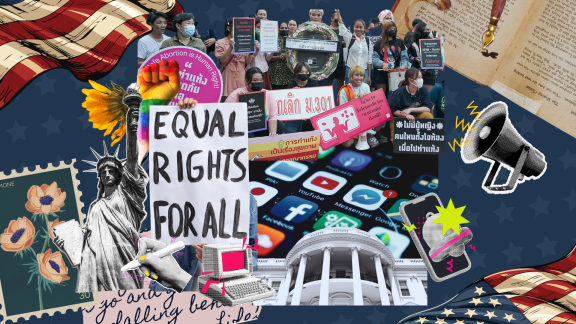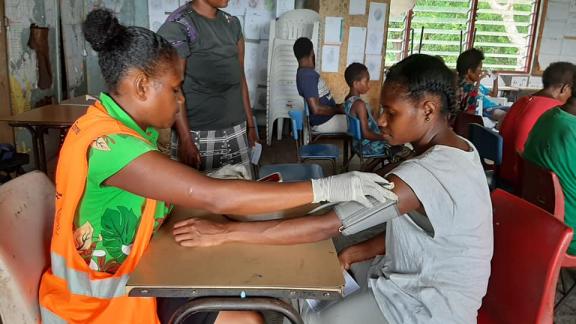As millions of U.S. voters head to the polls after a gruelling campaign season, disinformation remains a major concern. Platforms like Meta, Google, and X (formerly Twitter) have come under fire for the spread of unchecked false information with little to no transparency to reproductive rights organisations when their content is removed.
The Centre for Countering Digital Hate recently identified X as the "epicentre" of disinformation, revealing that false statements from Elon Musk about the U.S. election garnered 2 billion views. Disinformation—deliberately crafted to mislead and sway public opinion—not only restricts access to essential information but disproportionately impacts marginalised groups, including women, girls, migrants, and LGBTQIA+ communities.
Abortion rights have emerged as a pivotal issue this election cycle, with setbacks following the 2022 Supreme Court decision to overturn Roe v. Wade. The landmark ruling removed federal protections for abortion, empowering states to impose restrictions and sparking a wave of legal battles and grassroots activism nationwide. Candidates have presented starkly contrasting visions for reproductive health, with policies that could reshape both domestic and global agendas.
Project 2025, proposed by The Heritage Foundation, could lead the U.S. to defund and potentially withdraw from key UN organisations, affecting global health initiatives and Sexual and Reproductive Health and Rights (SRHR) programs. It calls for a major expansion of the Mexico City Policy (Global Gag Rule), which could restrict all U.S. foreign assistance linked to reproductive health, thereby limiting access to abortion, contraception, and maternal health services worldwide. Such shifts would directly impact IPPF and its Member Associations’ SRHR programs and services.

A Regional Perspective on Rights-Based Reporting
Closer to home, disinformation presents similar challenges in the Asia-Pacific, particularly around reproductive rights and democratic integrity. With over 2.5 billion internet users and social media usage reaching 82% in East Asia and 78% in Southeast Asia, disinformation has become a significant political and human rights issue, polarising societies and influencing elections. Narratives that emerge during U.S. election cycles are often adapted and circulated locally, complicating efforts to advance reproductive justice and comprehensive sexuality education (CSE) across the Asia-Pacific.
In response, IPPF ESEAOR teamed up with the Asia-Pacific Institute for Broadcasting Development (AIBD) to support journalists in delivering accurate, rights-based reporting. 50 media professionals from 17 countries—health reporters, editors, producers, and social justice advocates—came together to share strategies and examine how disinformation and anti-rights narratives shape public opinion on critical issues like reproductive health, often silencing marginalised voices in the process.
“Framing content through a rights-based lens or as a critical public health issue can significantly elevate public understanding and engagement, especially across digital platforms,” noted Allan Colinares Francisco from PTV News in the Philippines.
Based on a post-training survey, 83% of participants called for more effective strategies, while 76% emphasised the importance of staying informed about regional SRHR developments. Meanwhile, 69% expressed interest in solution-focused journalism to spotlight positive stories that counter negative coverage, and 72% to aimed to engage audiences by incorporating diverse voices. These findings point to an urgent need for better tools to tackle disinformation, adding new challenges to an already complex landscape for reproductive health, especially in the Pacific.
Navigating Stigma, Data Gaps, and Press Freedom in the Pacific
Restrictive abortion laws, entrenched stigma, underfunded health systems, and a lack of reliable data add complexity to reproductive healthcare. According to the Guttmacher Institute, an estimated 34 abortions occur per 1,000 women of reproductive age annually in the Pacific, with one-third deemed unsafe. Due to stigma and legal restrictions, these figures likely underrepresent the full extent of the issue.
In Papua New Guinea, the media’s changing role is echoed in recent policy debates. A draft media development policy introduced last year proposed re-establishing the Media Council of Papua New Guinea (MCPNG) as an independent body with the power to investigate complaints, set ethical standards, and impose penalties for violations. However, its focus on promoting news aligned with national development goals has raised concerns among journalists, who fear it could limit press freedom.
“Narratives are powerful tools. By sharing stories from the region, we help people see the human side of these critical issues,” said Jordan Dangi, a producer and presenter with MTV in Papua New Guinea. He stressed the need to connect with local communities, using community voices to counter opposition and frame SRHR topics in ways that inspire real dialogue.
Strengthening Media Resilience Against Disinformation
In support of regional resilience against disinformation, Australia pledged AU$68 million (around $45 million) over five years starting in July 2022 to foster independent media across the region. The Indo-Pacific Broadcasting Strategy, introduced in July, aims to strengthen cooperation between Australian and Pacific media and increase the region’s resilience to misinformation.
The Asia-Pacific Development, Diplomacy & Defence Dialogue (AP4D) warns that disinformation, increasingly embedded in political cultures and amplified by advanced AI technologies, will escalate threats to democratic societies over the next five years. In Southeast Asia, coordinated disinformation campaigns have become entrenched in domestic politics and are used as tools of strategic influence.
In response to demands from activists and healthcare practitioners, Indonesia recently passed a law extending the legal window for abortions in cases of rape and medical emergencies from six to 14 weeks. This reform aims to reduce Indonesia’s high maternal mortality rate—the highest in Southeast Asia—although it also grants police sole authority to approve abortions, raising concerns about potential barriers for survivors.
The National Commission on Violence Against Women reported 103 cases of pregnancies resulting from rape between 2018 and 2023. Many women have been unable to access safe abortions due to limited information, inadequate support for victims, and barriers related to socioeconomic status, education, geography, and cultural or religious beliefs.
Happy Indah Goeritman, a journalist with TVRI Indonesia, emphasised the importance of addressing issues that affect young people. “We must tackle essential topics like menstrual health, hygiene, and comprehensive sexuality education (CSE) to ensure they receive accurate information.”

Way Forward: A United Front through Regional Partnerships
Namgay Dema, a health reporter based in Bhutan, emphasised the need for a united front to tackle regional challenges. “A cohesive effort across the Asia-Pacific is essential. We need strong networks and shared strategies to counter disinformation.”
>The recent 19th Asia Media Summit (ASM) in Kuala Lumpur brought together over 400 media professionals from across the region, focusing on building resilient networks and addressing key issues like safeguarding democracy, countering disinformation, and promoting accessibility. A pre-summit workshop on Content Production for Reproductive Justice and Human Rights provided hands-on training in crisis reporting and amplifying community voices—critical areas for fostering a more informed and rights-driven media landscape.
“The rise of disinformation and anti-rights movements threatens media integrity, democracy, and reproductive justice, impacting marginalised communities. This initiative, a collaboration between AIBD and IPPF ESEAOR, aims to equip participants with the skills to address these challenges and enhance media coverage and public awareness of these critical issues,” said Tomoko Fukuda, IPPF ESEAOR Regional Director.
Echoing the need for an inclusive and adaptive media landscape, Philomena Gnanapragasam, Director and CEO of the AIBD Secretariat, added, “Moving forward, we’re committed to collaboration, understanding AI’s impact on media, and ensuring diverse voices are amplified to reflect today’s shifting realities and deliver impactful storytelling on critical issues.”
For more information on our coverage of the Asia Media Summit, click HERE and read more about our partnership with AIBD HERE.when









